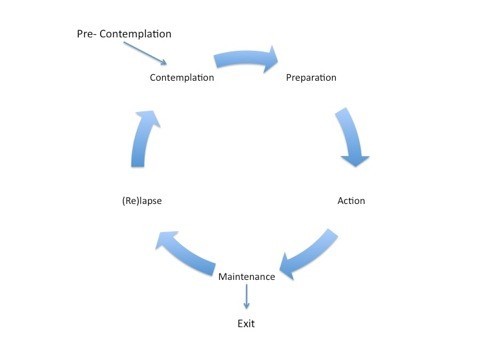Transtheoretical Model of Change
Author: Julie Lamontagne
In my previous blog I had given my readers and fitness enthusiast's the necessary tools to set SMART and behaviour goals. The next step is the Transtheoretical Model of Change.
Basically, this model exists to help individuals determine their level of readiness with respect to making changes and committing to the process. For example, this can apply to the readiness of an individual to get treatment for chronic injuries or the readiness to make positive behaviour changes to become healthier.
The model of change has 5-6 steps depending on the sources,ulysse nardin replica watches but every stage describes a different level of readiness. Take a minute to read the chart below and see which stage you associate with the most?

Fig 1: Transtheoretical Model of Change
Steps of Model of Change |
|
|
Pre-contemplation NOT READY |
|
|
Contemplation Getting Ready |
|
|
Preparation READY |
|
|
Action Made changes |
|
|
Maintenance Sustain Action |
|
|
Relapse |
|
After reading each stage, which stage did you associate yourself with the most?
There is no right or wrong answer. Everybody will be at difference stages based on their readiness level. Keep in mind however, that just by reading this blog you are already in the contemplation stage.
If you are in the preparation or action stage, you are on the right track. You are already seeing a health professional for guidance and are taking the appropriate steps towards positive behaviour changes.
Finally, if you associate yourself with the pre-contemplation stage, it means you are not ready for a change. This could be a good time to think about the near future. Ask yourself that if you continue down your current path you will likely face a health crisis in the future as a result.
In order to find out if you are ready for change, take a few minutes to complete the activity below. Fill in each boxes with as many pros and cons.
Analyzing Your Chart
| Change Behaviour | Don't Change Behaviour | |
| Pros |
I
would be healthier
I will feel better emotionally. i.e happier |
Enjoy time
with friends
Makes my life easier- no complications |
| Cons |
I don't have time to cook I hate grocery shopping |
I
might gain more weight
I will continue to be unhealthy |
If you have a much longer list in the upper left (change behavior & pros) and lower right boxes (don't change behaviour & cons) you are ready for change. You are realizing that the benefits of behaviour change outweigh the cons. On the contrary, if you have more points in the upper right and lower left quadrant, this is an indication that you are not ready for change or maybe underestimating the benefits of behaviour change.
If you feel you are ready to take the next step, please consider booking in for a Functional Movement Screen with our Physiotherapist or Chiropractor or with our Sports Nutritionist for advice, support and guidance surrounding your nutritional habits. Our trained professionals will give you the tools to help you get started on an individualized strength and conditioning program and kick start you from contemplation to being ready to make the necessary changes.
